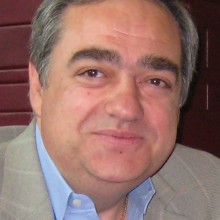
- This event has passed.
Colloquium Series: Spiros Anastasiadis (University of CRETE + FORTH)
Friday, October 25, 2019 @ 2:00 pm - 3:30 pm
 Join us for another event in the 2019-2020 Colloquium Series as APS welcomes Spiros Anastasiadis, PhD. to present on his recent research. Dr. Spiros is currently a Professor of Polymer Science and Engineering at the University of Crete and the Director of the Institute of Electronic Structure and Laser (IESL) of the Foundation for Research and Technology – Hellas (FORTH). He received his PhD in Chemical Engineering from Princeton University in 1988 whereas he has been a Visiting Scientist at the IBM Almaden Research Center in 1988-1989.
Join us for another event in the 2019-2020 Colloquium Series as APS welcomes Spiros Anastasiadis, PhD. to present on his recent research. Dr. Spiros is currently a Professor of Polymer Science and Engineering at the University of Crete and the Director of the Institute of Electronic Structure and Laser (IESL) of the Foundation for Research and Technology – Hellas (FORTH). He received his PhD in Chemical Engineering from Princeton University in 1988 whereas he has been a Visiting Scientist at the IBM Almaden Research Center in 1988-1989.
Development of Multi-Functional Surfaces with Controllable Wettability and Water Adhesion.
The design of multifunctional surfaces based on biomimetic structures has gained the interest of the scientific community. Such biomimetic structures can be achieved by using “smart” coatings, which can respond to external stimuli, such as light, temperature, electric field, pH or solvent selectivity, onto appropriately structured substrates. Novel multifunctional surfaces have been developed, able to alter their wetting properties in response to temperature and/or pH as well as light illumination, by combining proper chemistry and surface micro/nano-structuring. For this purpose, dual scale micro/nano-roughened surfaces are prepared by irradiating Si wafers using ultrafast (femtosecond) laser under a reactive atmosphere; polymeric or inorganic coatings are subsequently introduced to provide the desired functionality. The combination of such hierarchical surfaces with a ZnO coating results in efficient photo-catalytic properties as well as reversible superhydrophobicity / superhydrophilicity in response to the light illumination. Utilization of end-functionalized polymer chains anchored onto the hierarchical surfaces can lead to surfaces that exhibit reversible and controllable wettability to temperature and/or pH from the “parahydrophobic” behavior of natural plant leaves all the way to superhydrophilic properties in response to the external stimuli. Moreover, such surfaces can be seeded with human fibroblasts in order to examine the cellular response on both the surface roughness and the surface chemistry. Finally, altering the irradiation conditions results in surfaces with oriented motion of water droplets only on one direction.

